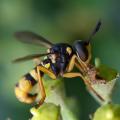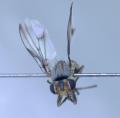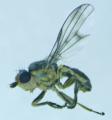Diptera.info :: Identification queries :: Diptera (adults)
Who is here? 1 guest(s)
|
unknown hairy Muscid
|
|
| Gateside |
Posted on 07-04-2020 10:28
|
|
Member Location: Cumbria, UK Posts: 74 Joined: 24.10.13 |
I believe this is a Muscidae. It has been suggested that the scutellum is deformed - it appears to form a half-cup shape rather than being relatively flat, or tilted. I initially rejected Tachinidae because the wing venation is wrong. The images as a whole are probably not clear enough to use a key, so I hope someone can recognise the fly. Size about 5 mm. Seen 04/04/2020, south Cumbria. More images to follow. Gateside attached the following image: 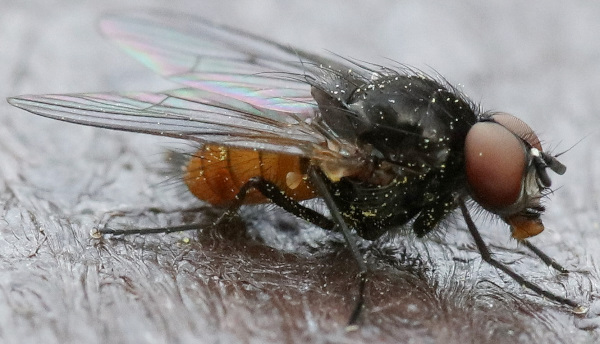 [110.13Kb] |
|
|
|
| Gateside |
Posted on 07-04-2020 10:30
|
|
Member Location: Cumbria, UK Posts: 74 Joined: 24.10.13 |
A closer view of the front end.
Gateside attached the following image: 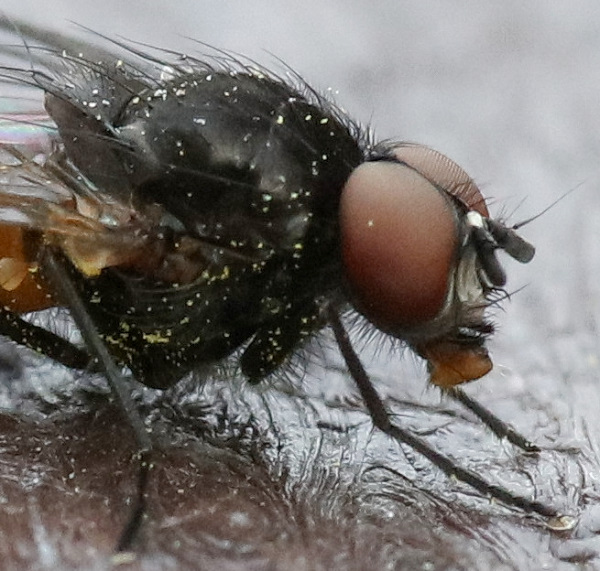 [159.88Kb] |
|
|
|
| Gateside |
Posted on 07-04-2020 10:31
|
|
Member Location: Cumbria, UK Posts: 74 Joined: 24.10.13 |
A slightly different view of the front end.
Gateside attached the following image: 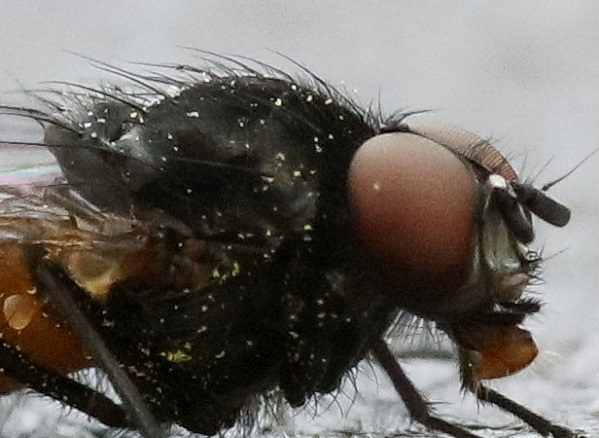 [113.33Kb] |
|
|
|
| Gateside |
Posted on 07-04-2020 10:32
|
|
Member Location: Cumbria, UK Posts: 74 Joined: 24.10.13 |
A dorsal view.
Gateside attached the following image: 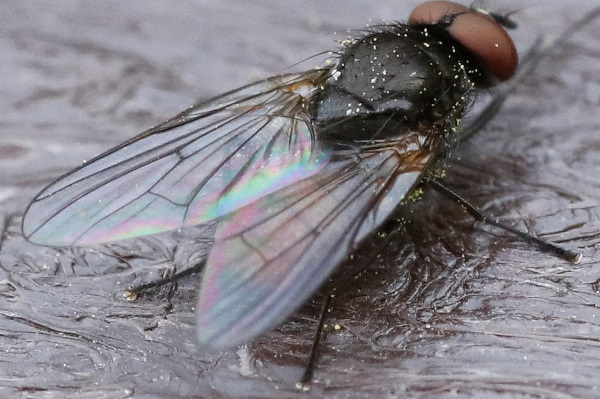 [136.28Kb] |
|
|
|
| John Carr |
Posted on 07-04-2020 13:00
|
|
Member Location: Massachusetts, USA Posts: 10229 Joined: 22.10.10 |
Thricops semicinereus? |
| Tony Irwin |
Posted on 07-04-2020 15:16
|
|
Member Location: Norwich, England Posts: 7239 Joined: 19.11.04 |
I don't recall ever having seen a male with completely orange abdomen...
Tony ---------- Tony Irwin |
|
|
|
| Gateside |
Posted on 07-04-2020 16:57
|
|
Member Location: Cumbria, UK Posts: 74 Joined: 24.10.13 |
I have just done a trawl through Diptera.info images, and agree with Tony about that point - no males with an all-orange abdomen. I also think that mine has a more dished face than any I can see anywhere. Nigel. By the way, thanks for the good starting suggestion, Paul! Edited by Gateside on 07-04-2020 18:34 |
|
|
|
| John Carr |
Posted on 07-04-2020 17:16
|
|
Member Location: Massachusetts, USA Posts: 10229 Joined: 22.10.10 |
Hydrotaea meridionalis? That white spot by the antennae made me think Azeliini, and H. meridionalis is another bicolored species. |
| Nikita Vikhrev |
Posted on 07-04-2020 18:38
|
|
Member Location: Moscow, Russia Posts: 9357 Joined: 24.05.05 |
Dear friends, I also tried to solve this mystery in the morning. Now I'm back, but still without answer so far.
Nikita Vikhrev - Zool Museum of Moscow University |
|
|
|
| Gateside |
Posted on 07-04-2020 19:08
|
|
Member Location: Cumbria, UK Posts: 74 Joined: 24.10.13 |
John Carr wrote: Hydrotaea meridionalis? That white spot by the antennae made me think Azeliini, and H. meridionalis is another bicolored species. An interesting suggestion, John. But I can't find any images of a male, but just females. I am pretty sure that the white thing at the top of the antennae is a clump of pollen, similar to some of the larger blobs on the thorax. I see there is a thread at https://diptera.info/forum/viewthread.php?thread_id=45541 I don't think there was a conclusion to this post! ... though it was a female, not a male. Nigel |
|
|
|
| Nikita Vikhrev |
Posted on 07-04-2020 19:38
|
|
Member Location: Moscow, Russia Posts: 9357 Joined: 24.05.05 |
H. meridionalis looks similar to H. borussica https://diptera.info/photogallery.php?photo_id=3309 John's idea was good, but I doubt that it is answer. I have a lot of material with me (for co-quarantine: me+Diptera). In H. irritance group f3 and t3 should be strongly curved. Muscid on these imags looks as Lophosceles hians with dark legs https://diptera.info/photogallery.php?photo_id=6268 Sorry, I have no idea. Nikita Vikhrev - Zool Museum of Moscow University |
|
|
|
| johnes81 |
Posted on 07-04-2020 19:57
|
|
Member Location: Berlin, Germany Posts: 1978 Joined: 15.10.16 |
Hi everyone, the white spot is similar to Hydrotaea pellucens. borussica and meridionalis males have a very noticeable brush of feathery bristles sticking out of the middle of the hind tibia. I think that Hydrotaea pellucens is a better match. The photos posted are ridiculously small for debating features, so the author of the post will have to examine larger photos for comparison to Hydrotaea pellucens. Best wishes, John John and Nini. Naturalists not experts. |
|
|
|
| Tony Irwin |
Posted on 07-04-2020 20:58
|
|
Member Location: Norwich, England Posts: 7239 Joined: 19.11.04 |
I have trouble seeing this as a Hydrotaea - the legs seem to me to be too simple and lack the modifications typical of that genus.
Tony ---------- Tony Irwin |
|
|
|
| Waldgeist |
Posted on 07-04-2020 23:59
|
|
Member Location: Posts: 296 Joined: 07.09.19 |
Looks like Fanniidae or Anthomyiidae, not Muscidae. |
| John Carr |
Posted on 08-04-2020 00:08
|
|
Member Location: Massachusetts, USA Posts: 10229 Joined: 22.10.10 |
Waldgeist wrote: Looks like Fanniidae or Anthomyiidae, not Muscidae. It appears to have 4 postsutural dorsocentrals, Sc bent as usual in Muscoidea, A1 ending halfway to wing margin, and A2 not curved enough to meet the extension of A1. |
| Gateside |
Posted on 08-04-2020 07:41
|
|
Member Location: Cumbria, UK Posts: 74 Joined: 24.10.13 |
Nikita Vikhrev wrote: H. meridionalis looks similar to H. borussica https://diptera.info/photogallery.php?photo_id=3309 John's idea was good, but I doubt that it is answer. I have a lot of material with me (for co-quarantine: me+Diptera). In H. irritance group f3 and t3 should be strongly curved. Muscid on these imags looks as Lophosceles hians with dark legs https://diptera.info/photogallery.php?photo_id=6268 Sorry, I have no idea. I have looked at the image of Lophosceles hians, and (apart from the yellow legs!) looks very similar, except that mine has at least 2 prominent spines in the middle of the hind tibia, but the photo specimen does not have any in the middle. So I suggest it's probably not that species. I have looked at my images of the legs in case this is useful, and it's difficult to see properly in poor light (in the shade of a huge Picea pungens!), so this is the best photo, post-processed. Gateside attached the following image: 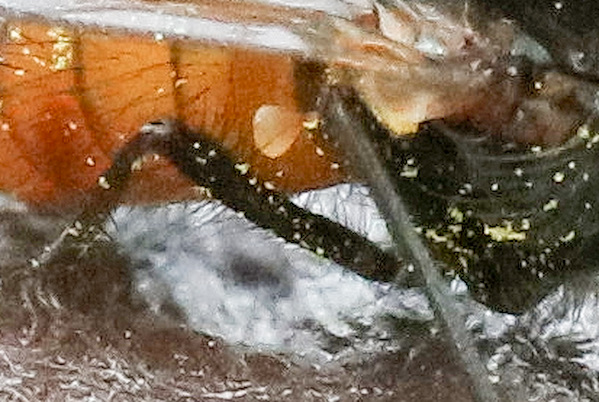 [145.3Kb] Edited by Gateside on 08-04-2020 07:43 |
|
|
|
| Jump to Forum: |



